Key takeaways:
- Writing communities provide essential support, feedback, and motivation, fostering a sense of belonging among writers.
- Engagement in workshops enhances creative skills through collaboration, structured feedback, and exposure to diverse writing styles.
- Building long-term connections within writing communities enriches both personal growth and creative exploration.
- Consistent sharing and critique help writers build confidence, embrace vulnerability, and discover new aspects of their craft.
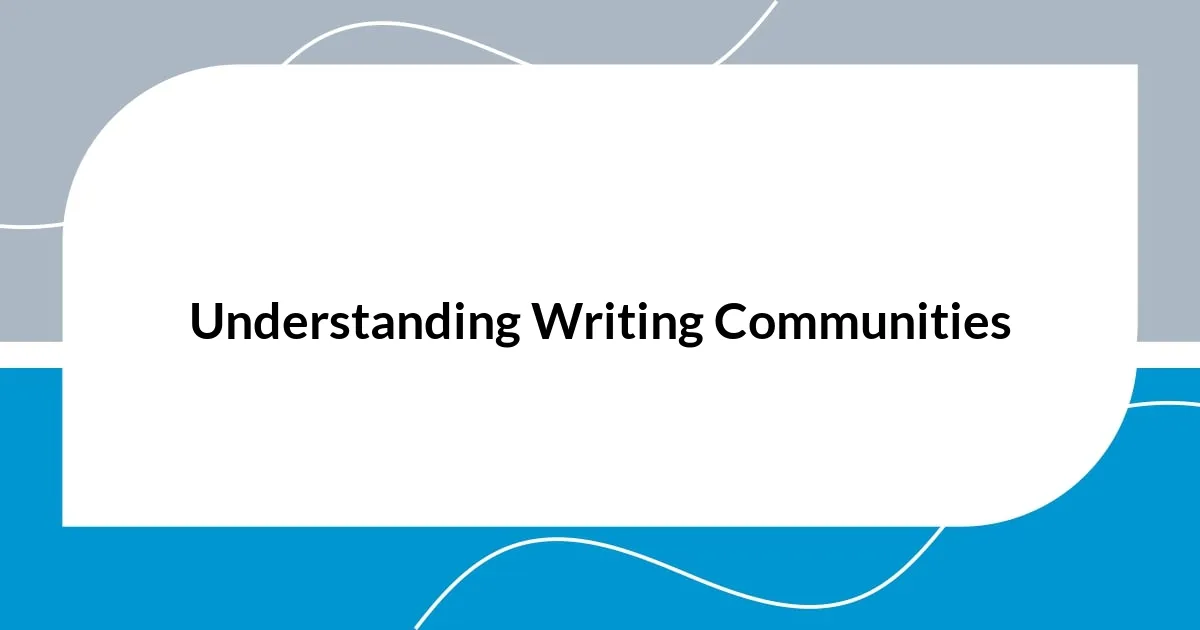
Understanding Writing Communities
Writing communities are vibrant spaces where writers connect, share, and grow. I remember the first time I joined a local writers’ group; it felt like stepping into a warm embrace filled with creativity. Have you ever felt isolated in your writing journey? That sense of belonging can be transformative.
These communities play an essential role in honing our craft. They provide valuable feedback that can sometimes be hard to hear, but it’s always aimed at helping us improve. I once received a critique on a short story I was particularly proud of; initially, I felt defensive, but that feedback later became the foundation for my best work.
Engagement in a writing community fosters accountability and inspiration. I often find myself motivated to write just because a fellow member shares their progress. It’s a dynamic energy that reinforces the idea that we’re not alone in our struggles and triumphs as writers. Isn’t it amazing how collaboration can fuel creativity?
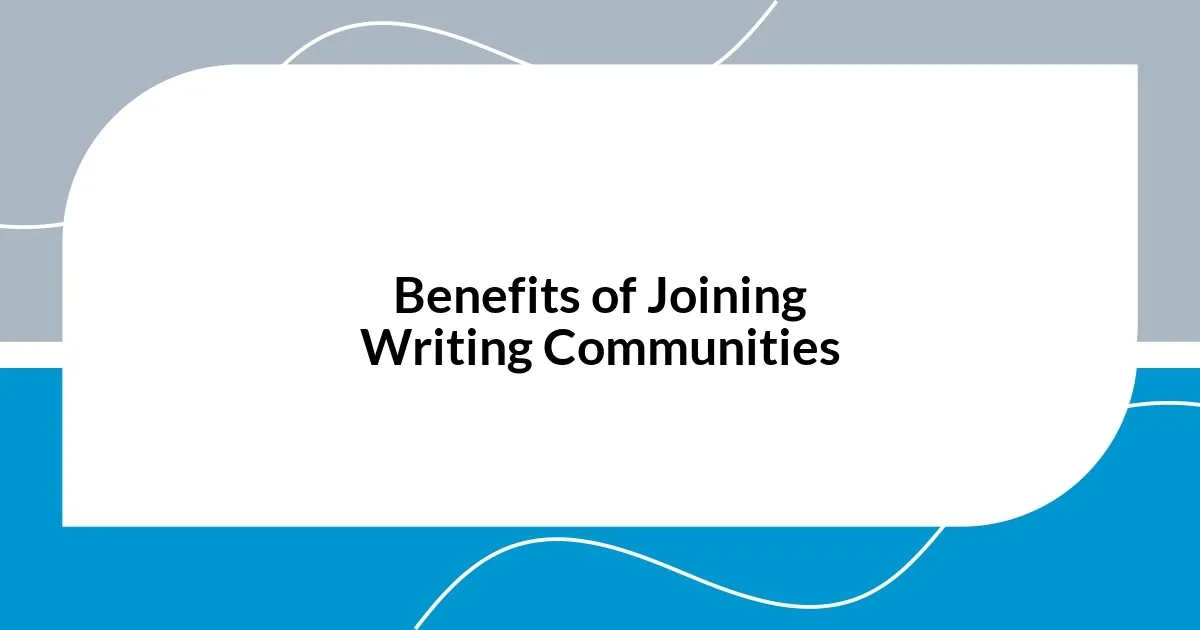
Benefits of Joining Writing Communities
Being part of a writing community is like having a safety net as I navigate the often tenuous path of creativity. The encouragement from fellow writers reminds me of those times I felt discouraged after a rejection letter. I vividly recall sharing a particularly rough draft during a group meeting; the warmth of their support turned that initial embarrassment into motivation. It’s incredible how surrounding myself with like-minded individuals can lift my spirits, fueling my determination to keep honing my craft.
Joining a writing community not only enhances my writing skills but also broadens my perspective. Engaging with diverse voices and styles has taught me to embrace differences in storytelling. I remember one workshop focusing on poetry, a genre I usually shy away from. The experience pushed me out of my comfort zone, and it sparked an exciting creative journey. Here are some additional benefits I’ve noticed from being part of these communities:
- Regular Feedback: Constructive criticism helps refine my work, making it stronger.
- Networking Opportunities: Connecting with other authors can lead to collaborations and friendships.
- Skill Development: Workshops and discussions provide practical tips and insights.
- Motivation and Accountability: Encouraging each other fosters a commitment to our writing goals.
- Exposure to New Ideas: Sharing experiences introduces fresh concepts and techniques that stimulate creativity.
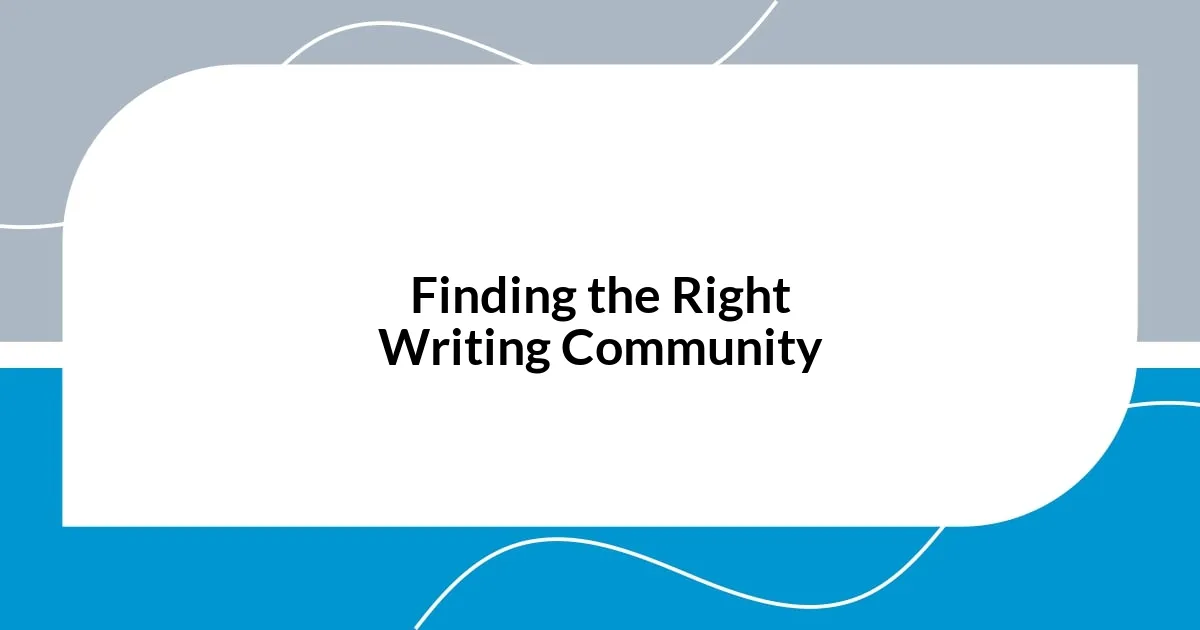
Finding the Right Writing Community
Finding the right writing community can feel a bit like dating. Each group has its unique vibe, and sometimes it takes a few tries to find the one that resonates with you. I remember attending several groups before I found the perfect fit—one that felt genuine and supportive. The variety in approaches and personalities really highlighted how crucial it is to identify what you need from a writing community.
When looking for a community, consider the type of support that speaks to you. For instance, some writers thrive in more structured environments with feedback sessions, while others prefer casual meetups. I once joined a workshop that focused intently on goal-setting; it motivated me immensely, but I realized I craved more spontaneous discussions about story ideas. This taught me the importance of aligning my needs with the community I choose—it’s all about creating the right energy for my writing journey.
Finally, don’t underestimate the power of vibe. The intangible feelings we get in a space can make or break our experience. I recall visiting one group where I felt an immediate warmth and camaraderie; this made me more comfortable sharing my work. It’s essential to trust your instincts and find that community where you feel you truly belong.
| Criteria | Description |
|---|---|
| Feedback Style | Structured feedback sessions vs. casual critiques |
| Type of Members | Genre-specific vs. diverse genres |
| Frequency of Meetings | Regular schedule vs. flexible popping in |
| Atmosphere | Professional development focused vs. friendly and casual |
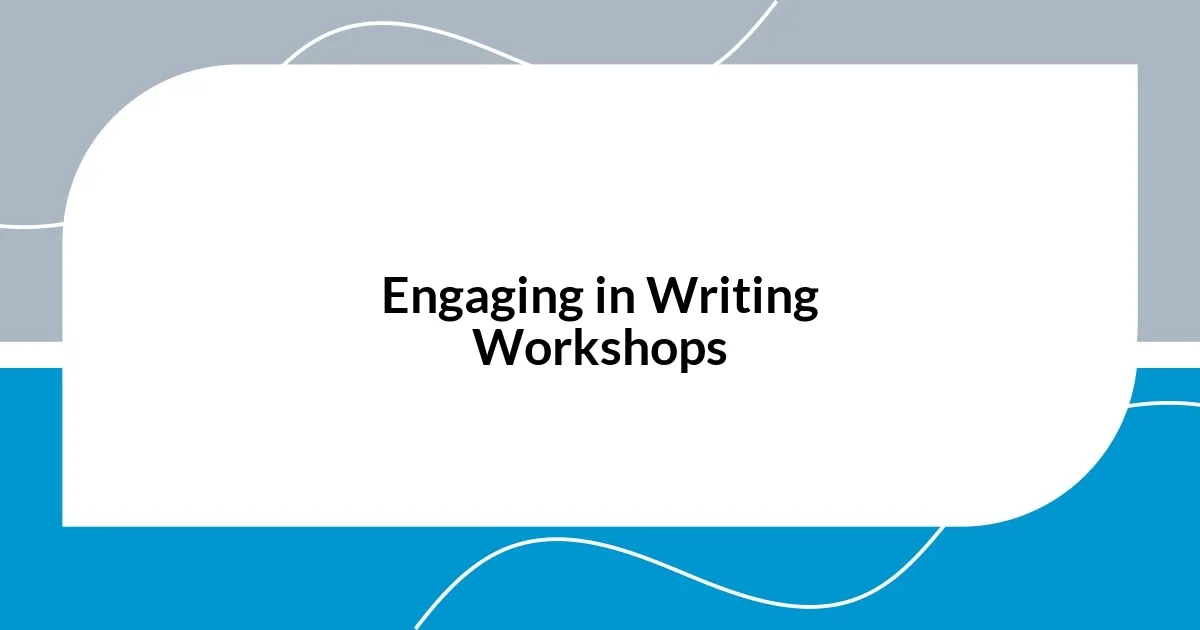
Engaging in Writing Workshops
Engaging in writing workshops has been a transformative experience for me. I recall one particular session where we all shared our favorite drafts, creating an environment of trust and camaraderie. The exhilaration of hearing my words read aloud—combined with the instant feedback from peers—ignited a spark in my creative process. Have you ever felt that rush when your work resonates with others? It’s one of those moments that reinforce why I keep coming back.
The structured format of workshops works wonders for my writing. On one occasion, we focused on character development, diving deep into what makes a character truly compelling. While I was initially hesitant to share my protagonist, the supportive atmosphere encouraged me to unveil my creation. The insights I gained from my peers were invaluable, pushing me to think critically about my character’s motivations. I often wonder how many potentially great stories remain untold due to lack of feedback.
Moreover, writing workshops provide a unique opportunity for collaboration. I never expected to find a writing partner in such a casual setting. Yet, after a few quick brainstorming sessions, I found someone whose style complemented mine. Together, we explored themes that neither of us would have dared to tackle alone. Isn’t it fascinating how a simple workshop can lead to such unexpected partnerships and creative breakthroughs? These experiences confirm the importance of engaging in these communal gatherings—they are truly a catalyst for growth.
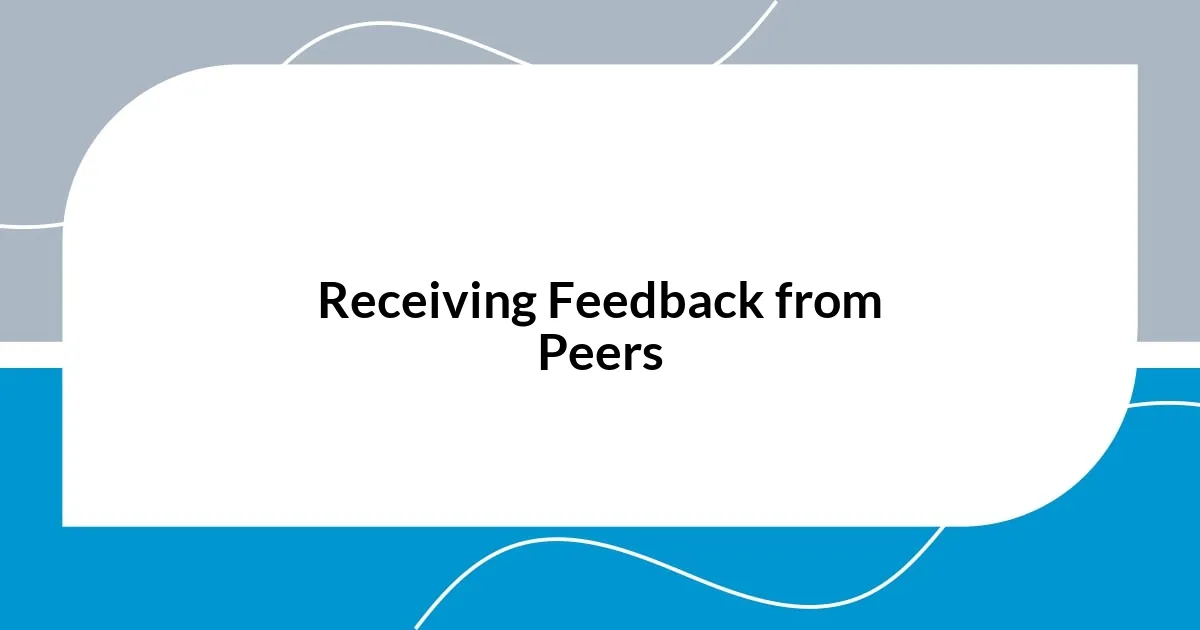
Receiving Feedback from Peers
Receiving feedback from peers has been a game changer in my writing journey. I remember one time when I shared a particularly vulnerable piece about my childhood. The feedback I received from my peers was profound; not only did they appreciate my honesty, but their insights also helped me discover layers in my writing I hadn’t seen before. Have you ever felt that rush of validation when someone truly understands your work?
There’s something special about the diversity of perspectives I encounter in my writing communities. In one session, I presented a poem that I thought was finished. The constructive criticism I received—suggestions to rethink the imagery—led to a complete rewrite that I still cherish today. This taught me that the value of peer feedback isn’t just about finding what’s wrong; it’s also about unearthing possibilities I hadn’t considered.
Navigating through different feedback styles can also be enlightening. I once participated in a group that divided critiques into three categories: what worked, what didn’t, and what to explore further. This structured approach made it easier for me to digest the feedback without feeling overwhelmed. I often find myself reflecting on how each piece of feedback connects back to my own writing goals. I’d love to hear your thoughts on how feedback has shaped your creative process—is there a particular comment that changed your perspective entirely?
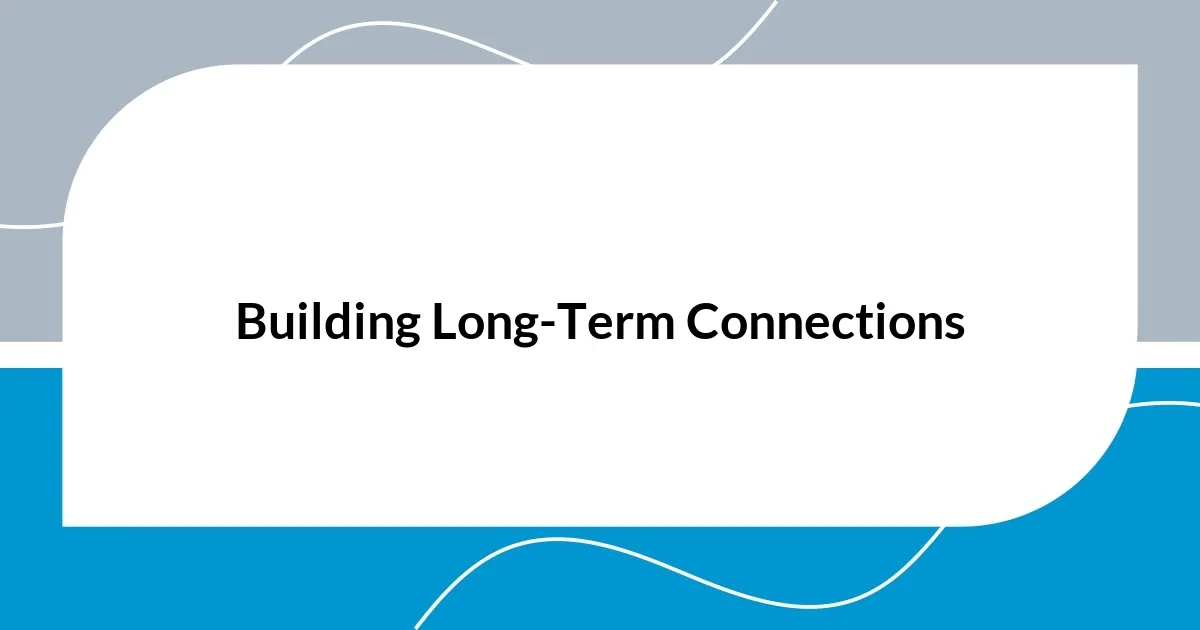
Building Long-Term Connections
Building long-term connections is one of the most rewarding aspects of being part of a writing community. I remember the first time I met a fellow writer at a local café for our regular meet-up. What started as a casual conversation about our favorite genres turned into a thriving friendship, where we now exchange drafts and brainstorm ideas for novels. Don’t you find it remarkable how shared passions can forge connections that last beyond the initial meeting?
As we collaborated over the years, I have witnessed firsthand how these relationships deepen the writing experience. For instance, during one brainstorming session, my friend and I challenged each other to write outside our comfort zones. I tackled a genre I’d always feared—science fiction. The thrill of sharing progress with someone who believed in me was exhilarating. That leap of faith not only expanded my repertoire but also strengthened our bond. Have you experienced that exhilarating moment when someone encourages you to take creative risks?
Moreover, these connections often extend beyond writing. I’ve celebrated milestones with my writing friends, from publishing our first books to simply sharing successes at open mic nights. It’s comforting to know that we cheer each other on and provide support during tough times. Isn’t it enriching to cultivate relationships that encourage growth, both personally and creatively? I truly believe that the beauty of these long-term connections lies in the mutual motivation and inspiration we provide each other, fueling our progress as writers.

Enhancing Your Writing Skills
Enhancing your writing skills can feel like climbing a mountain, but the right community can shorten that journey tremendously. I recall a time when I joined a workshop focused on short story writing; the instructor shared techniques that brought my characters to life in ways I hadn’t thought possible. Being in that space with fellow writers, all grappling with similar challenges, felt like unlocking a door to a world of creativity I had yet to explore. Have you ever had that “aha” moment where everything just clicked?
Practicing writing regularly within a community has also been a game changer for me. Last year, I participated in a month-long writing challenge with some peers. The structured prompts pushed me to experiment with styles and genres I would have typically avoided. By holding each other accountable, I was able to produce pieces that surprised even me. It’s fascinating how the encouragement from others can turn a daunting practice into an enjoyable exploration, isn’t it?
Additionally, I’ve learned that sharing my work consistently builds my confidence over time. There was a point when I hesitated to show my writing to anyone because I feared judgment. But joining a supportive critique group changed that for me. With every reading, I discovered pieces of myself I hadn’t realized were just waiting to be expressed. This gradual exposure has not only made me a better writer but has also allowed me to embrace vulnerability in my craft. Do you find that sharing your work opens up new avenues of self-discovery?